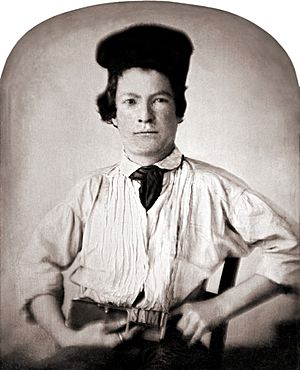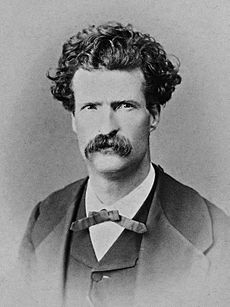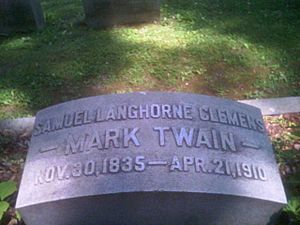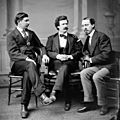Mark Twain facts for kids
Quick facts for kids
Mark Twain
|
|
|---|---|
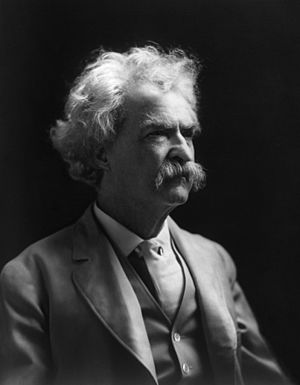
Mark Twain, 1909.
|
|
| Born | Samuel Langhorne Clemens November 30, 1835 Florida, Missouri, U.S. |
| Died | April 21, 1910 (aged 74) Redding, Connecticut, U.S. |
| Pen name | Mark Twain |
| Occupation | Writer |
| Nationality | American |
| Notable works | Adventures of Huckleberry Finn, The Adventures of Tom Sawyer |
| Signature | |
 |
|
Samuel Langhorne Clemens (November 30, 1835 – April 21, 1910), known to the world as Mark Twain, was a well known American writer. Twain lived a life full of adventure. He worked for newspapers and as a steamboat pilot on the Mississippi River before he became a writer. In later life he invested and lost the money that his writing had made, and toured the world giving lectures that brought him enough money to pay his debt and recover his fortune.
Twain is celebrated for writing classic books like The Adventures of Tom Sawyer and Adventures of Huckleberry Finn, which are still read and loved by people all over the world today. Many people consider him one of the most important figures in American literature because of his unique writing style and the way he captured the American spirit and language of his time.
Contents
Early Life
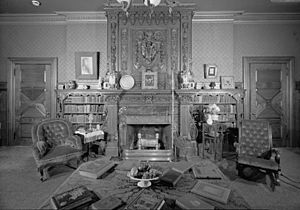
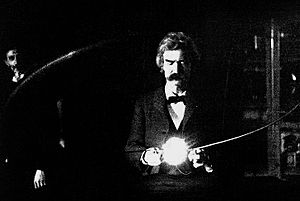
Samuel Langhorne Clemens was born on November 30, 1835, in Florida, Missouri to a Tennessee country merchant, John Marshall Clemens (August 11, 1798 – March 24, 1847), and Jane Lampton Clemens (June 18, 1803 – October 27, 1890). He was one of seven children, but sadly, only three of his siblings lived to be adults. When he was four, his family moved to Hannibal, Missouri, a town right on the mighty Mississippi River. This town and the river itself became hugely important in his life and his writing, serving as the setting for his most famous stories about Tom Sawyer and Huckleberry Finn.
Life wasn't always easy. His father, a lawyer and judge, passed away when Samuel was just 11 years old. This meant Samuel had to leave school after only the fifth grade to help support his family. He became a printer's apprentice, learning how to set type for newspapers. He later worked as a typesetter in different cities like New York, Philadelphia, and St. Louis. Working in libraries in the evenings, he continued to learn and educate himself.
But the job that truly captured his imagination was being a riverboat pilot on the Mississippi River. He described it as the "grandest position of all," even better than the captain. Pilots had to know the river incredibly well – every turn, every sandbar, every hidden danger – even in the dark. It took him over two years to get his pilot's license. This experience gave him the material for his book Life on the Mississippi and, importantly, gave him his famous pen name. "Mark Twain" was the call riverboat pilots used to announce a depth of two fathoms (12 feet), which meant the water was safe for the boat. He adopted this name in 1863.
Tragedy struck during his time on the river when his younger brother, Henry, whom Samuel had convinced to work with him, died in a steamboat boiler explosion in 1858. This event deeply affected Twain throughout his life.
When the Civil War began in 1861, river traffic slowed down, and Twain's career as a pilot ended. He briefly joined a local group of Confederate volunteers but left after only two weeks.
Heading West
After leaving the river, Twain headed west to Nevada to join his older brother, Orion, who had become the secretary of the Nevada Territory. Twain tried his hand at mining for silver, but he wasn't very successful. He soon returned to journalism, working for a newspaper called the Territorial Enterprise in Virginia City, Nevada. It was here, on February 3, 1863, that he first used the pen name "Mark Twain" on a humorous travel story.
His experiences in the West provided material for his book Roughing It. He also spent time in California, where he heard a story that became his first big success as a writer: "The Celebrated Jumping Frog of Calaveras County," published in 1865. This funny story brought him national attention.
Travels and Family Life
Twain's fame grew, and he began traveling and writing about his experiences. A trip to the Mediterranean, Europe, and the Middle East resulted in his popular book The Innocents Abroad (1869). On this trip, he met Charles Langdon, who showed him a picture of his sister, Olivia Langdon. Twain was immediately smitten, and after writing to her for a while, they married in February 1870.
Olivia came from a wealthy and progressive family, and through her, Twain met many interesting people who supported causes like ending slavery and advocating for women's rights. Mark and Olivia had four children, but sadly, only one, Clara, lived a long life. Their son, Langdon, died as a baby, and their daughters Susy and Jean died in their twenties. These losses brought great sadness to Twain's life.
The Clemens family lived in Buffalo, New York, for a few years before moving to Hartford, Connecticut, in 1873. They also spent many summers at Quarry Farm in Elmira, New York, the home of Olivia's sister. These homes were where Twain wrote many of his most famous books.
Writing
Mark Twain's writing career started with humorous sketches and travel stories, but he became known for his novels that blended humor with sharp observations about society.
Early Works and Travel
After his success with "The Celebrated Jumping Frog," Twain continued writing for newspapers and giving lectures. His travel letters were very popular. The Innocents Abroad poked fun at American tourists and the places they visited in Europe and the Middle East. Roughing It did the same for the American West.
He also wrote The Gilded Age: A Tale of Today with his neighbor Charles Dudley Warner. This book gave a name to the period in American history after the Civil War, known for its rapid growth but also for corruption and inequality.
The Mississippi Novels
Twain's experiences on the Mississippi River were the inspiration for some of his most enduring works. The Adventures of Tom Sawyer (1876) tells the story of a mischievous boy growing up in a small Missouri town. Tom was based partly on Twain himself and some of his childhood friends. The book also introduced Huckleberry Finn, a character who would become the star of Twain's next major novel.
Adventures of Huckleberry Finn (1884) is often considered Twain's masterpiece and a truly great American novel. It follows Huck, who runs away from his abusive father and floats down the Mississippi River on a raft with Jim, a runaway slave seeking freedom. The book is famous for its realistic portrayal of the language spoken by people along the river and for its powerful look at the issue of slavery and freedom. It was a more serious book than Tom Sawyer, though still full of adventure and humor.
Later Works and Financial Challenges
Twain wrote many other books, including The Prince and the Pauper (1881), a historical novel about two boys who switch places, and A Connecticut Yankee in King Arthur's Court (1889), which sends a modern American back in time to medieval England, using technology to shake things up.
Despite his success as a writer and speaker, Twain faced significant financial problems. He invested heavily in new inventions, like a complex typesetting machine called the Paige Compositor, which unfortunately didn't work out. He also lost money through his publishing company. These setbacks led him to lose a lot of the money he had earned.
To pay off his debts, Twain embarked on a long, worldwide lecture tour in the mid-1890s. With the help of a wealthy friend, Henry Huttleston Rogers, Twain was able to manage his finances and eventually paid back everyone he owed, even though he wasn't legally required to do so after facing bankruptcy. His experiences on the lecture tour led to another travel book, Following the Equator.
In his later years, Twain continued to write, though he also experienced more personal loss with the deaths of his wife and two of his daughters. Some of his later writings were more serious and philosophical, exploring themes of human nature and society. His autobiography, which he dictated in a non-linear way, was published in volumes starting 100 years after his death, just as he wished.
Views
Mark Twain was known for being outspoken about his views on many topics, and his opinions sometimes changed over his lifetime.
Twain was a strong supporter of progress and technology. While he believed in individual effort, his views on society and fairness evolved. He became a supporter of labor unions, believing that workers deserved a fairer share.
He was also a vocal critic of imperialism, which is when a powerful country takes control of other lands and peoples. While he initially supported American expansion, he changed his mind, especially after seeing the effects of the Philippine-American War. He became a vice-president of the American Anti-Imperialist League and wrote against the idea of the United States controlling other countries. He also criticized European powers for their actions in Africa.
Twain was a firm supporter of civil rights and the abolition of slavery. He believed that everyone, regardless of their race, deserved justice and fair treatment. He even helped pay for some young people of color to attend college. He also supported women's right to vote.
His views on different groups of people changed over time. While some of his early writings contained prejudiced ideas common at the time, his later works and actions showed a growing belief in equality and fairness for all.
Death
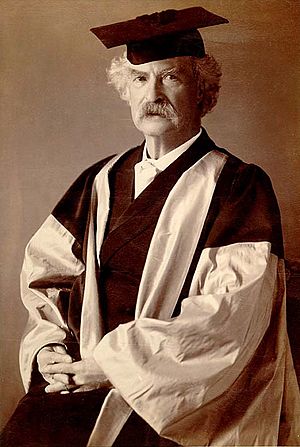
In 1909, Twain is quoted as saying:
I came in with Halley's Comet in 1835. It is coming again next year, and I expect to go out with it. It will be the greatest disappointment of my life if I don't go out with Halley's Comet. The Almighty has said, no doubt: 'Now here are these two unaccountable freaks; they came in together, they must go out together.'
His prediction was accurate – Twain died of a heart attack on April 21, 1910, in Redding, Connecticut, one day after the comet's closest approach to Earth.
He is buried in his wife's family plot at Woodlawn Cemetery in Elmira, New York. His grave is marked by a 12-foot (i.e., two fathoms, or "mark twain") monument, placed there by his surviving daughter, Clara. There is also a smaller headstone.
Legacy
Mark Twain remains one of America's most beloved writers. His stories continue to entertain readers of all ages, and his characters, like Tom Sawyer and Huckleberry Finn, are famous around the world. His use of realistic language and his blend of humor and social commentary had a huge impact on American literature.
His legacy lives on through his timeless books and his reputation as a sharp-witted observer of the human condition.
Interesting facts about Mark Twain
- Halley's Comet appeared in the sky during the year Twain was born and the year he died. This periodic comet comes back every 74 years, which is how long he lived.
- He is often pictured wearing a white suit, which became his trademark later in life, especially after his wife's death.
- Twain was fascinated with science and scientific inquiry. He developed a close and lasting friendship with Nikola Tesla, and the two spent much time together in Tesla's laboratory.
- He was a Republican for most of his life.
- Twain patented three inventions, including an "Improvement in Adjustable and Detachable Straps for Garments" (to replace suspenders) and a history trivia game. Most commercially successful was a self-pasting scrapbook; a dried adhesive on the pages only needed to be moistened before use.
- Oxford University awarded Twain an honorary doctorate in letters (D.Litt.) in 1907.
- Twain raised money to build a Presbyterian Church in Nevada in 1864.
- He was a Freemason.
Mark Twain quotes
- "Kindness is the language which the deaf can hear and the blind can see."
- "Good decisions come from experience. Experience comes from making bad decisions."
- "Give every day the chance to become the most beautiful day of your life."
- "Continuous improvement is better than delayed perfection."
- "The two most important days in your life are the day you are born and the day you find out why."
- "To be great, truly great, you have to be the kind of person who makes the others around you great."
- "If you have no will to change it, you have no right to criticize it."
- "Courage is not the lack of fear. It is acting in spite of it."
Images for kids
-
Twain House in Hartford, Connecticut
-
Twain photographed in 1908 via the Autochrome Lumiere process
See also
 In Spanish: Mark Twain para niños
In Spanish: Mark Twain para niños
 | Leon Lynch |
 | Milton P. Webster |
 | Ferdinand Smith |


